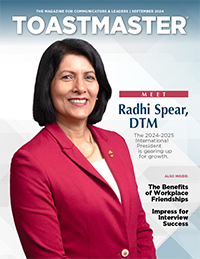Ken Blanchard (renowned leadership consultant and Toastmasters’ 1992 Golden Gavel recipient) once said “feedback is the breakfast of champions.” Evidence shows this to be true. People who can take all kinds of feedback and grow from it tend to be more successful in most aspects of life.
Microsoft founder and CEO Bill Gates is a good example of this. He has continued to achieve incredible success throughout most of his life, in part due to his inclination to seek feedback. In his 2013 TED Talk, Gates said, “We all need people who will give us feedback; that is how we improve.”
Indeed, isn’t this why we all attend Toastmasters meetings, “to improve”?
Although each of our particular reasons for joining Toastmasters are unique and varied (e.g., to speak more confidently, write persuasive speeches, gain confidence in social settings), we all share an underlying intent—to become better, to improve.

To aid us in our journey of self-improvement, Toastmasters teaches us how to give and receive an effective evaluation. However, far more time seems to be spent in teaching us how to give an effective evaluation than in how to receive one. For instance, the Effective Evaluation manual dedicates far more instruction to “when you are the evaluator” (four pages) than “when you are the speaker” (just under one page).
In my experience, effective evaluations will get us only so far in self-improvement. We also need personal skills and tools to be able to act on the information. In other words, diagnosing the areas where we need to improve is only half the battle; we also need the tools to act on the diagnosis.
Using the tools that I have learned in my career as a psychologist, a Ph.D. student and a mother, I welcome and embrace all sorts of feedback. These tools have helped me to successfully navigate feedback from my 9-year-old son (“You talk too much; I’d love to take you to a land where you wouldn’t be able to talk.” He has a point.), an advanced Toastmaster (“Your pants and boots enhanced the ‘goose step’ parading that you adopted on the stage; you want to avoid looking military.”), and a man, unknown to me, who was in jail for murder (“You ought to practice what you preach—if you’re supposed to be so compassionate, come and visit me in jail.”).
Although receiving feedback can sometimes take us outside our comfort zone and away from the safety and security of an intact self-esteem, if we want to improve ourselves then we have to take notice of how other people see us and willingly consider what they say. To that end, I’m going to share with you three tools to help you make the most of your Toastmasters evaluations while keeping your self-esteem intact.
1 Believe that you can change! Some people don’t accept that they are capable of significant change, thinking that their abilities are fixed. Either you’re good at something or you’re not, you’re smart or you’re not, you’ve been born a certain way and there is nothing much you can do about it. You may hear people who think this way say, “I’m not going to try for the speech competition; I’m just not good enough.” Carol Dweck, author of Mindset: How You Can Fulfill Your Potential, refers to this attitude as a fixed mindset.
On the other hand, there are people who believe that their skills, abilities and successes come from practice, perseverance and learning—not just from natural ability. They will give anything a go, knowing that all experiences (including failures) present an opportunity for learning. You will hear people of this mindset say, “I’m entering the speech competition to see how I do and learn where I need to improve for next time.” They have what is called a growth mindset.
The type of mindset that you have will greatly influence how you view critical feedback. For example, if you have a fixed mindset, you may view any critical feedback as a condemnation of your character. Your ego is threatened and you deploy sophisticated defense mechanisms to protect yourself (e.g., “The evaluator just doesn’t like me; that is why he gave me a bad evaluation.”). If you have a growth mindset, you tend to view feedback as data, or pieces of information that you take into consideration to help you grow, learn and improve. You view feedback not as a threat but as valuable input into your journey of becoming an effective speaker.
The next time you receive an evaluation, try to approach it from a growth mindset. I think you’ll find it makes a big difference in what you learn from it.
2 Learn to tolerate discomfort and vulnerability. It can be tough at times to hear critical feedback. Despite years of working on this, I sometimes still feel a blow to my self-esteem when someone criticizes me. But then I remember Buddha’s wise story, which helps me understand, accept and move on from any negative feelings associated with being criticized.
Buddha described our pain and suffering as being hit by two arrows. The first arrow is an event that actually happened, something that we have little control over. Consider this being a negative piece of feedback in your evaluation. The second arrow is then shot by ourselves. We focus on our reaction to the feedback and how it makes us feel (e.g., “I hate when people say that to me.” Or “I always get the same feedback. This sucks. I’m never going to get better at this.”).
If you have a growth mindset, you tend to view feedback as data, or pieces of information that you take into consideration to help you grow, learn and improve.
In life, we can never stop the first arrow from firing, but we can do a lot to stop the second arrow. As Haruki Murakami, a Japanese author, writes in his book What I Talk About When I Talk About Running: “Pain is inevitable; suffering is optional.”
Mindfulness is a way of understanding the emotions that arise when we are criticized. We become curious about what those feelings are and where they come from. We don’t need to act on them or deny them, just observe them. Observe the emotions non-judgmentally, as if you are trying to describe to others how you are feeling.
Most emotions come at us like a wave. They build and peak but with enough time and calmness they will subside. Our goal is not to react at the top of the wave, but to tread water until the wave of emotion passes. When the emotion passes we become far more capable of thinking clearly and responding to feedback clearly and rationally.
We will always experience critical feedback as long as we live. As American author and meditation teacher Joseph Goldstein puts it, “You can’t stop the waves, but you can learn to surf.” Try to approach your evaluations mindfully by surfing any waves of negative emotions that may first arise from an evaluation so that you can then openly listen to the feedback that is being delivered to you.
3 Listen to feedback with FIRE. Let’s say you’ve just received an evaluation that goes something like this:
The purpose of the speech was to be persuasive; it should focus on the self-interest of the audience. … Unfortunately, you did not use any logic to support your viewpoint. In fact, you bombarded us with technical jargon that was not easily understood by a layperson. Your speech was quite monotonous and boring, and you certainly didn’t appeal to the audience’s self-interest. I would encourage you to do this speech over again.
No question—this is tough feedback, so use mindfulness to first deal with any negative emotions you may be feeling. Next, take a growth mindset and believe you can learn something from this feedback. Lastly, try to see, specifically, what it is that you can learn.
Consider such feedback by using Mark Murphy’s FIRE technique: Facts, Interpretations, Reactions and Ends (FIRE).
The Facts
Facts are the things that you can see, hear and validate. Facts are objective, provable and verifiable. When receiving an evaluation it is important to focus on the facts more than anything else. For example, fact: In the speech you delivered that drew the above evaluation, you did not use logic. You presented no facts, research or rationale. Fact: You used technical words. To learn the most from the evaluation, try asking the evaluator to provide you with more specific information. Specifics can include things such as: “You used 10 ums and technical words like ‘social constructionism.’ And when you said that ‘X’ had the highest rate of ‘Y’ in the world, you gave no reference to support the facts.” With specific factual information at your disposal you are likely to learn far more.
The evaluation you received also contains some non-factual information, such as, “You didn’t appeal to the audience’s self-interest.” This is non-factual because it is one person’s opinion, and there is no evidence to say that the entire audience really felt this way. However, if a few people concur with the feedback, or you’ve been given similar feedback in the past, then it makes sense to examine the criticism more closely. So let’s stay focused on the parts of the feedback you can actually learn from, which are the facts.

Interpretation
Once we observe a fact, our mind uses our own life history, previous experiences and personality to interpret it, to put it into context and give it meaning. That’s interpretation. This is why we all take something different from a speech. On this occasion the evaluator interpreted the speech as “not appealing to the audience’s self-interest,” but this may not have been everyone’s experience. So unless you get similar feedback consistently, try not to get too bogged down in this part of the evaluation. Again, look to the facts for what can actually be verified.
Reactions and Ends
Once a fact has been interpreted, we tend to react to it emotionally. In this case, the evaluator said they found the speech to be “quite monotonous and boring.” The evaluator’s emotional reaction has caused them to pursue some end, which in this case is to suggest that the speaker repeat the speech. But again, remember, this is one person’s evaluation. So unless the feedback is consistent, be mindful that it is one person’s opinion and not a fact.
To get the most out of an evaluation it’s best to seek out and concentrate on the facts, and try not to get dissuaded by the interpretations, emotional reactions and end.
Feedback systems are what give life to everything on this planet. Feedback systems occur in our bodies (to maintain homeostasis) and in nature (positive and negative feedback systems form ecosystems). Feedback systems also play a role in how any society forms. By using the three tools I have outlined— 1) a belief in your capacity to change, 2) tolerance for discomfort and vulnerability, and 3) categorizing evaluations with FIRE—you will give yourself the best chance of getting the most out of your Toastmasters evaluations and grow as a person and a speaker.
Kristen Hamling, PhD is a trauma and positive psychologist and a Toastmaster in Whanganui, New Zealand. She is the founder of Wellbeing Aotearoa, which focuses on trauma-informed well-being practices. A facilitator, coach, and researcher, she has also served in the Australian Army Reserve. Learn more on her website.


 Previous
Previous
 Pathways Improves Evaluation Process
Pathways Improves Evaluation Process
 Previous Article
Previous Article